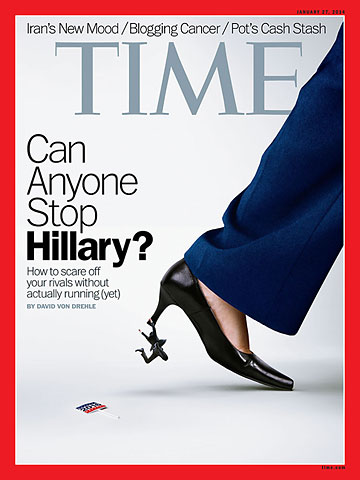
(5 of 7)
The Decision
Clinton's luxury of indecision coincides with a phase of presidential politics treasured by insiders. The election is close enough to be real yet far enough away that key factors--the candidates, the state of the economy, the foreign and domestic news--remain blissfully unknowable. Pundits have free rein to make predictions that cannot be checked. One widespread forecast holds that Clinton is poised for a cakewalk of historic proportions.
The theory goes like this: Between his first victory in 2008 and his narrower win in 2012, Obama suffered a significant 4% loss in support from white women. Nevertheless, his strength among minority voters was sufficient to give him a relatively easy re-election victory. Demographic trends indicate that the minority share of the electorate will grow even more by 2016 even as the Republican Party remains split over policies, like immigration reform and voting rights, that might attract those voters. As a result, Clinton is positioned to hold on to Obama's minority support while catalyzing the enthusiasm of women. The combination could produce a landslide.
Veteran Democratic pollster Stanley Greenberg, an old Clinton hand from way back, is among those who argue that the political landscape is highly favorable to Clinton in 2016. Other party elders are not so sanguine, however. "No matter who we nominate, the Republican theme will be the same: it's time for a change," one senior Democratic strategist told me. "Hillary will be cast as a third term for Obama. They'll try to hang all the trouble with health care on her. And if they manage to put up a serious candidate, we could be in a tough spot."
Call it pessimism or call it realism--for nervous Democrats, 2016 looks to be another hard fight across the narrow ground of a few swing states. Broad demographic trends will matter less, they fear, than a relative few hearts and minds in places like Ohio, Pennsylvania and Michigan. Hopeful Republicans are making the same calculation, which is fueling the ambitions of aspirants with strong working-class appeal, men like New Jersey Governor Chris Christie, Ohio Governor John Kasich and Wisconsin Governor Scott Walker. By this analysis, nominee Clinton could find herself--as in 2008--hoisting shots and boasting about her bowling skills in a gritty fight for Rust Belt voters.
This prospect gives her pause, according to sources close to Clinton, and she will be using the coming year to make her own cool-eyed assessment of GOP chances. Like all of her toughest calculations, this will take place inside a tight circle of trusted family and friends: husband Bill, daughter Chelsea, longtime staff members Capricia Marshall, Melanne Verveer, Cheryl Mills and Maggie Williams. Not all of them are gung-ho for another campaign. According to a report in Politico, which Clinton sources did not dispute, both Mills and Williams have argued against waging a 2016 campaign, while Chelsea has said publicly that she wants her mother to take a break before making any big decisions.
